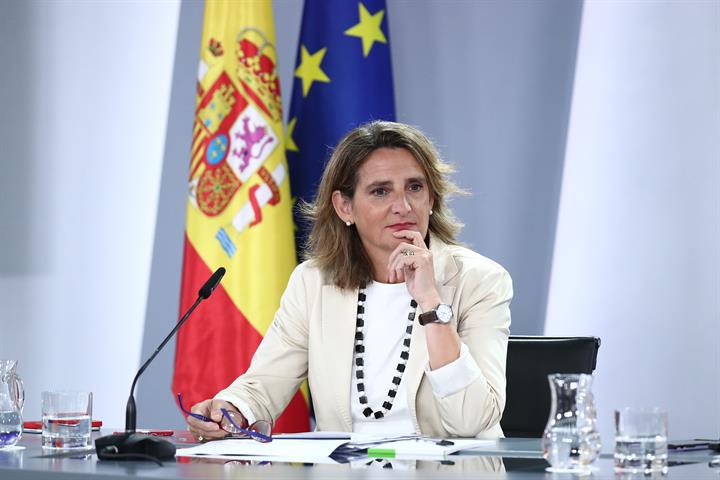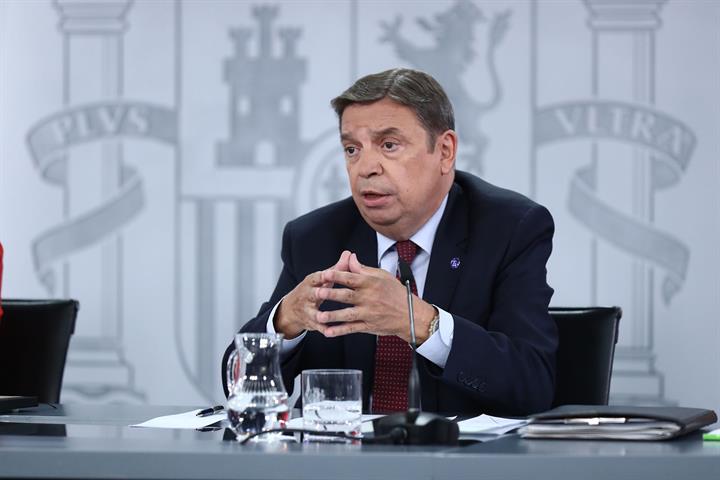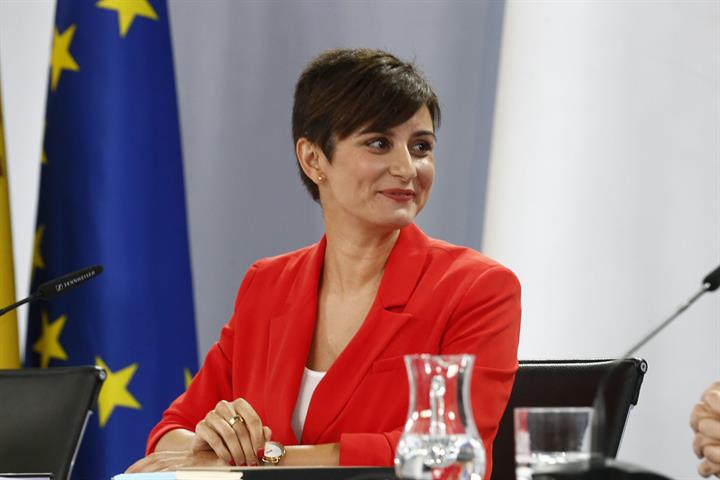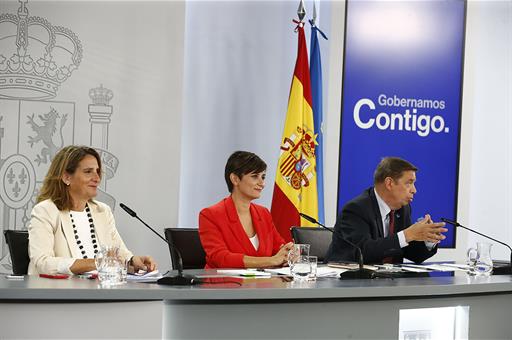Council of Ministers
The Government insists that its drought plans facilitate water supply to the population and productive sectors
Council of Ministers - 2023.9.13
Moncloa Palace, Madrid
The Council of Ministers examined the Report on Drought Management in 2023, which shows that the water reserve in reservoirs has decreased over the last ten years.
Third Vice-President and Acting Minister for Ecological Transition and Demographic Challenge, Teresa Ribera, has stressed that the hydrological year, which began on 1 October 2022 and ends on 30 September, has been very dry.
Precipitation is down 17.1% compared to the 1991-2020 average, and the water reserve is at 37%. The Guadalquivir basins (19.15%), the inland basins of Catalonia (23.3%), the Guadalete (17%%), Barbate (16.5%) and the Andalusian Mediterranean basins (25%) are in the most serious states.
Ribera explained that the recent DANA has brought relief in some areas and improved soil moisture but has not led to a significant change in available water. It can rain the same amount over the course of a year as it does in the space of two or three weeks, but in the latter case it is very difficult to retain the water, she argued.
Government action to tackle the drought
The climate emergency is causing increasingly frequent and intense droughts, which is why, as the vice-president explained, the government has responded since the beginning of the legislature with different actions and investments in all the river basins totalling €12 billion, and aimed at promoting desalination and water reuse, and at improving pipelines and regulation infrastructures.
This is in addition to the €3.06 billion for the digitalisation of the water cycle and the €2.13 billion for the modernisation of irrigation systems, with the aim of reducing leaks and losses.
Teresa Ribera has announced that the executive is reviewing the Special Drought Plans approved in 2018 to facilitate their management. In her opinion, the application of these plans has been "particularly important this year, facilitating the guarantee of supply for the entire population and minimising the impact of the drought on the productive sectors, which does not mean that there are no impacts but rather that they are minimised and the maintenance of ecosystems is guaranteed".
 The Third Vice-President and acting Minister for the Ecological Transition and Demographic Challenge, Teresa Ribera, during her speech at the press conference after the Council of Ministers | Pool Moncloa/Fernando Calvo
The Third Vice-President and acting Minister for the Ecological Transition and Demographic Challenge, Teresa Ribera, during her speech at the press conference after the Council of Ministers | Pool Moncloa/Fernando Calvo
However, the vice-president considers it is necessary to intervene in cases of emergency, which require a swift and immediate reaction, and to support those whose access to water concession volumes for irrigation is restricted with complementary measures, exempting them from the payment of water charges, activating emergency wells, guaranteeing supply to the population with the most supply problems or subsidising desalinated water.
Ribera added that Spain is reaching the end of a particularly dry hydrological year "with practically no impact from the point of view of supply", except for some problems in small towns or isolated areas and occasional limitations on non-essential uses for the population or restrictions in some irrigation systems.
Effects of the drought on the agricultural sector
The acting Minister for Agriculture, Fisheries and Food, Luis Planas, has pointed out that the most significant consequence of the drought is lower food production, both in rainfed and irrigated crops.
In the case of cereals, production is forecast at 11 million tonnes, whereas harvests are usually between 18 and 24 million tonnes, meaning that more will have to be imported to cover domestic consumption.
The decrease has also been very noticeable in olive oil: the average campaign is around 1.4 million tonnes, while this year's will be around 663,000 tonnes. This has caused a "significant increase" in the price of oil, said the minister, who added that the rains this month may contribute to a more abundant next season, although it will probably not exceed one million tonnes.
The drop for wine grapes has been less pronounced: this year's crop is expected to be around 36 million hectolitres compared to last year's 41 million. The Minister for Agriculture, Fisheries and Food is confident that the stocks in storage will allow prices to remain "relatively stable" and the market to be supplied.
Planas pointed out that, according to the Consumer Price Index published today, food prices have risen by 10.5% in the last 12 months, three tenths of a percentage point less than the previous indicator, representing a "stabilisation with a downward trend".
Support measures for agricultural workers and farmers
 The acting Minister for Agriculture, Fisheries and Food, Luis Planas, during his speech at the press conference after the Council of Ministers | Pool Moncloa/Fernando Calvo
The acting Minister for Agriculture, Fisheries and Food, Luis Planas, during his speech at the press conference after the Council of Ministers | Pool Moncloa/Fernando Calvo
The minister highlighted the effectiveness of agricultural insurance in alleviating the damage caused by the drought. As of 31 August, €974 million worth of damage had been assessed, of which more than half corresponds to drought compensation to be received by farmers and stockbreeders. In addition, subsidies for the contracting of these insurances have risen this year to €358 million.
The sector is also counting on the various measures adopted by the executive to alleviate the consequences of the drought and those resulting from the war in Ukraine. "There is no period in our history, either recent or ancient, when such significant support has been given to the primary sector as a whole: almost €3.99 billion," he said. Of this amount, 1.38 billion is direct aid: €713 million is earmarked for specific drought aid to be paid from October onwards, and the rest is related to taxation, liquidity, fertilisers, diesel subsidies and support for the fisheries sector.
A third pillar of support for the primary sector is the Common Agricultural Policy (CAP), which Luis Planas has defined as a "formidable instrument". The minister put the direct aid for Spain at €4.875 billion and stressed that the negotiations with Brussels have allowed the advance payment of these funds to be increased from 50% to 70%. Spain has also obtained €81 million from the crisis reserve fund - the largest amount in the EU as a whole - to alleviate the damage caused by the drought, as well as other flexibility measures and support for specific sectors.
Adaptation to climate change
Faced with the reality of climate change, the Minister for Agriculture defended the need to control the rise in temperatures and, at the same time, adapt to the situation in terms of food production. "As the OECD said recently, we need to complement and increase productivity in the primary sector by 28% by 2030 if we want not only to maintain our environmental commitments, but to continue producing food," he said.
The solution to this challenge, he argued, lies in the choice of certain crops depending on the water available, the modernisation of irrigation, precision agriculture and livestock farming and new genetic editing techniques in plant production.
Recognition of aid worker Emma Igual and withdrawal of Pinochet's decoration
 The Government Spokesperson and acting Minister for Territorial Policy, Isabel Rodríguez, during her speech at the press conference after the Council of Ministers | Pool Moncloa/José Manuel Álvarez
The Government Spokesperson and acting Minister for Territorial Policy, Isabel Rodríguez, during her speech at the press conference after the Council of Ministers | Pool Moncloa/José Manuel Álvarez
The Council of Ministers has awarded the Order of Isabella the Catholic to Emma Ascaso Igual, the Spanish aid worker killed in a Russian attack in Ukraine. The Minister for Territorial Policy and spokesperson for the acting government, Isabel Rodríguez, recalled that right from the beginning of Russia's "illegal and illegitimate aggression", the aid worker was dedicated to evacuating citizens from the most at-risk areas. "The government hereby wishes to recognise her work and that of all Spanish aid workers who are working on the ground in particularly difficult situations," he said.
Likewise concerning decorations, the government has agreed to withdraw the Cross of Military Merit from the dictator Augusto Pinochet, awarded by the Franco regime in 1975. This decision, said Rodríguez, "is a sign of coherence in the commitment to democratic values and rights and freedoms".
New airborne surveillance system
The executive has authorised the contract for the procurement of a new airborne surveillance system to replace maritime patrol aircraft and maritime surveillance aircraft. The estimated value of the contract is €2 billion.
The government spokesperson detailed that a total of 16 aircraft are to be built and will be available around 2031. The investment, he said, will improve defence work, maritime traffic safety and the rescue of people in humanitarian emergencies, and reflects the government's commitment to Spain's defence industry and to employment in the sector.
Non official translation





